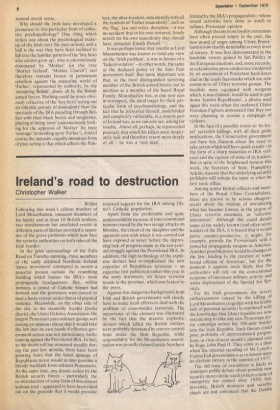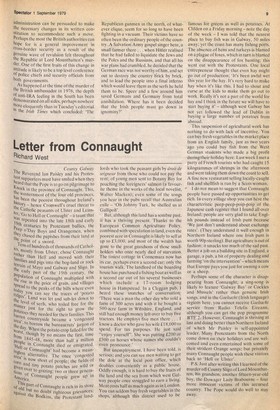Ireland's road to destruction
Christopher Walker
Belfast Following this week's callous murders of Lord Mountbatten, innocent members of his family and at least 18 British soldiers, two simultaneous but unrelated events in different parts of Belfast provided a remin der of the grave problems which now face the security authorities on both sides of the Irish border.
In the grim surroundings of the Falls Road on Tuesday morning, three members of the sadly depleted Northern Ireland 'peace movement' attempted to mount a peaceful protest outside the crumbling building which houses the IRA's main propaganda headquarters. But, within minutes, a crowd of Catholic women had formed and the protesters were forced to beat a hasty retreat under threat of physical violence. Meanwhile, on the other side of the city in the staunchly loyalist Docks district, the Ulster Defence Association, the largest Protestant para-military group, was issuing an ominous threat that it would take the law into its own hands if effective government action was not immediately forth coming against the Provisional IRA. In fact, as the death toll has mounted steadily during the past few months, there have been growing fears that the latest upsurge of Republican terror would in time provoke a bloody backlash from militant Protestants. At the same time, any drastic action by the British security forces — particularly the re-introduction of some form of internment without trial — appeared to have been ruled out on the grounds that it would provoke renewed support for the IRA among Ulster's Catholic population.
Apart from the predictable and quite understandable increase in inter-communal tension caused by the two savage attacks on Monday, the extent of the slaughter and the apparent ease with which it was carried out have exposed as never before the depressing lack of progress made in the ten-yearold struggle against the Provisional IRA. In addition, the high technology of the explosive devices had re-emphasised the new expertise of Republican terrorists — an expertise first publicised earlier this year in the army document, on future terrorist trends in the province, which was leaked to the press.
Against this dangerous background, both Irish and British governments will clearly have to make fresh efforts to deal with the problem of cross-border terrorism. The importance of this element was illustrated by the fact that the massive explosive devices which killed the British soldiers were probably detonated by remote control from inside the Dish Republie, while responsibility for the Mountbatten assassination was proudly claimed inside Northern Ireland by the IRA's propagandists — whose recent activities have done so much to inflame Protestant opinion.
Although threats from loyalist extremists have often proved empty in the past, the new mood of anger among Ulster Protestants is now readily detectable at every level of society. It was first demonstrated in the landslide victory gained by Ian Paisley in the European elections, and, more recently, at a clandestine press conference conducted by an assortment of Protestant hard-liners clad in the crude face-masks which are now common to all Ulster terrorist groups. The loyalists were equipped with weapons which, it was claimed, would be used to gun down 'known Republicans', a phrase used again this week when the outlawed Ulster. Freedom Fighters announced that they too were planning to resume a campaign of violence.
In the face of a possible return to `tit-fortat' sectarian killings, with all their grisly implications, the Conservative government can have few illusions about the need to take action which will have quick results—in the form of a sharp reduction in IRA violence and the capture of some of its leaders. But in spite of the heightened tension this week, the Secretary of State, Humphrey Atkins, is aware that the underlying security problems still remain the same as when he first took office.
Among senior British officers and members of the Royal Ulster Constabulary, there are known to be serious disagreements about the wisdom of introducing what has become known, in the jargon of Ulster terrorist measures, as 'selective internment', Although this could detain some of the widely known (and often seen) leaders of the IRA, it is feared that it would prove counter-productive; it might, for example, provide the Provisionals with a powerful propaganda weapon in America. Another possible move would be changes in the law, leading to the creation of some broad offence of 'terrorism', but for the moment it appears more likely that the authorities will rely on the conventional response of increased military activity and wider deployment of the Special Air Services.
For the Irish government, the severe embarrassment caused by the killing of Lord Mountbatten (together with his feeble lack of personal security) is combined with the knowledge that Ulster loyalists are now threatening to take any new Protestant terror campaign across the 300-mile border into the Irish Republic, Such threats could pose problems of unprecedented proporT tions in view of next month's planned visit by Pope John Paul II. They come at a time when the internal standing of Mr Lynch 's Fianna Fail government is at its lowest since its election victory in the summer of 1977. The old issue of extradition is likely to dominate public debate about possible new security moves in the south (where a state of emergency has existed since 1939) but, privately, British ministers and security chiefs are not convinced that the Dublin
administration can be persuaded to make the necessary changes in its written constitution to accommodate such a move. Perhaps the most the British authorities can hope for is a general improvement in cross-border security as a result of the genuine wave of revulsion felt throughout the Republic at Lord Mountbatten's murder. One of the first fruits of this change in attitude is likely to be a top level conference of police chiefs and security officials from both governments.
As happened at the time of the murder of the British ambassador in 1976, the depth of anti-IRA feeling in the South has been demonstrated on all sides, perhaps nowhere More eloquently than in Tuesday's editorial In the Irish Times which concluded: 'The Republican gunmen in the north, of whatever clique, seem for so long to have been fighting in a vacuum. Their victims have so often been the ordinary people of the country. A Salvation Army gospel singer here, a small farmer there .. . when Hitler realised that he had failed to liquidate the Jews and the Poles and the Russians, and that all his war plans had crumbled, he decided that the German race was not worthy of him, and set out to destroy the country lirick by brick, and to lead the people into a final inferno which would leave them as the serfs he held them to be. Speer and a few around him saved Germans and Germany from total annihilation. Where has it been decided that the Irish people must go down in ignominy?'































 Previous page
Previous page